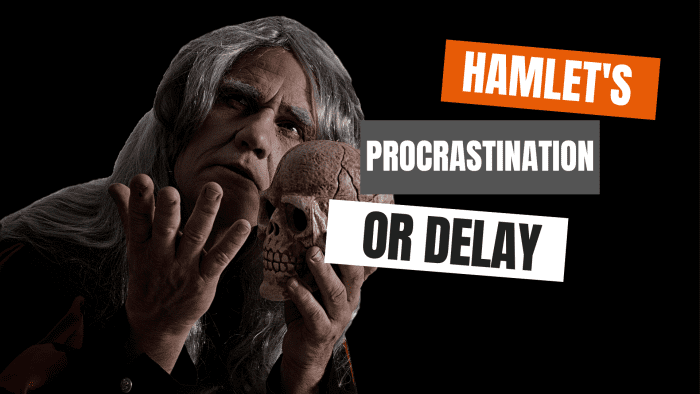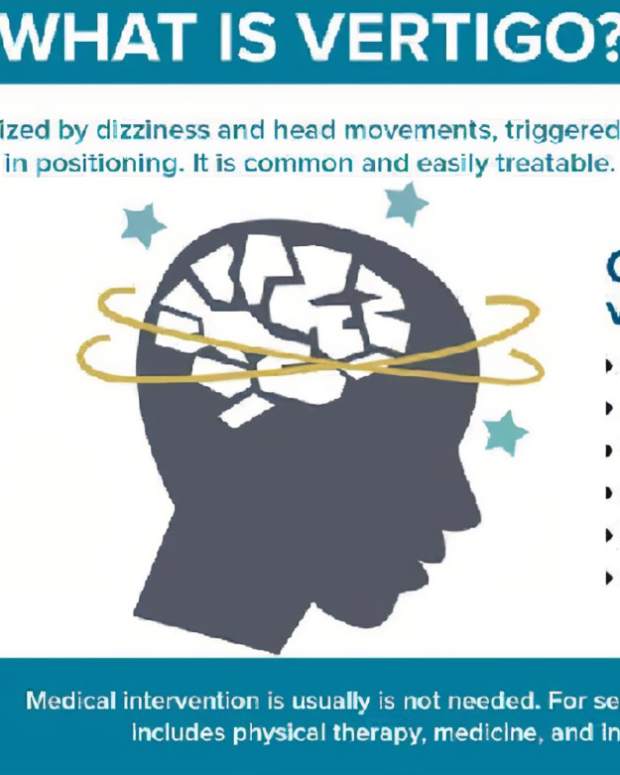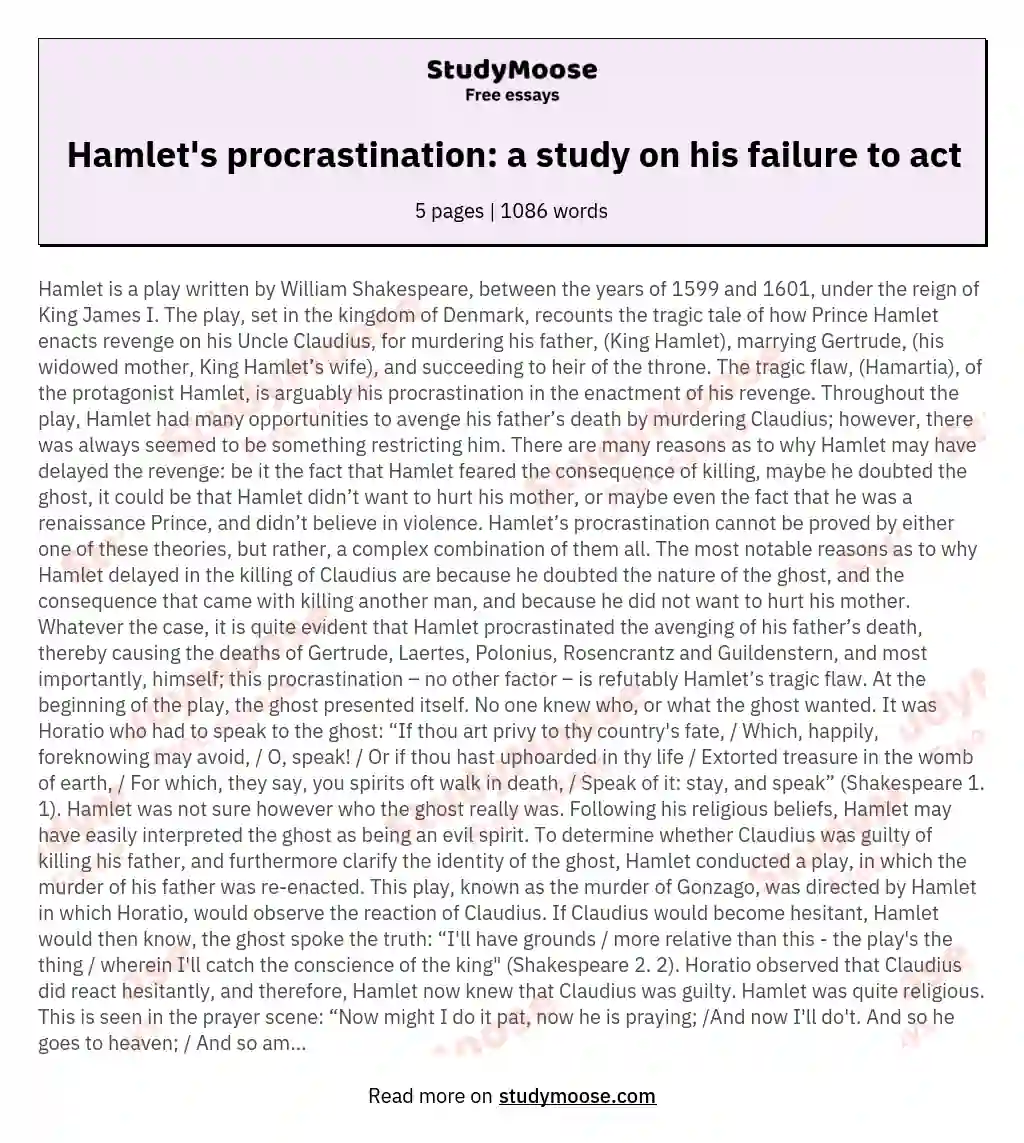Hamlet's Procrastination Essay Example
| 📌Category: | , , , |
| 📌Words: | 969 |
| 📌Pages: | 4 |
| 📌Published: | 04 May 2021 |
Throughout the whole play of Hamlet, the constant hesitation and procrastination is represented through Hamlet’s character; he is deeply reflective, delays his revenge numerous times, and is cursed with having to commit acts he struggles with consciously. The play Hamlet, “... is the most self- conscious literature figure ever created” (Rosenblum). He as a character struggles with the act of committing revenge. Hamlet's father was murdered by his father’s brother. A ghost visits Hamlet giving him the message to get revenge. Hamlet is portrayed to be procrastinating more often than anything else.
Hamlet isn’t only hesitant about the revenge. He also carries the dread of taking his own life. In one his most famous soliloquies, “To be or not to be”, he proclaimed:
Fear of death makes us all cowards, and our natural boldness becomes weak with too much thinking. Actions that should be carried out at once get misdirected, and stop being actions at all. (Hamlet 3, 1, 83-89).
He has so many questions without answers, “Hamlet is haunted by unanswerable questions and mortality and death” (Themes and Construction). This thought was short lived as he had realized that you don’t know what death is like and taking your own life is a sin. He was not sure if he would go to hell or heaven. Hamlet also would not have given his father his wishes of revenge. When waiting to get revenge he was challenged with an extreme amount of troubles.
Being in his own head had made him lose the sense of life and his duties. Some may believe he is crushed, “The cost of Hamlet’s infinite self -reflexivity is incapacity of action. Such is the curse of self- consciousness” (Critchley. Webster 12). Hamlet has experienced a great deal of troubles, he is very self- reflexive. It is almost like a curse. Hamlet is still a young kid, so taken on the pressure of wanting to get revenge for his father makes him over think. So much of the pressure leads to, “His tendency to overanalyze his options, thus paralyzing his own ability to act” (Themes and Construction). Being that he thought about it too much causes a major delay.
All the people that Hamlet knew to be close to him, turned out they were betraying him, at least he thought. Hamlet ran through every scenario in his head about revenge. The beliefs from philosophers, psychoanalysts, and crites have diagnosed Hamlet with procrastination. They exclaimed that because of his waiting and hesitation it drove Hamlet to go mad (Critchley. Webster 12). Having to commit such a big task is scary. In an article that refers to Hamlet as the avenger states, “Revenge delayed and an avenger who breathes himself for procrastination” This article also mentions, “Among these are a ghost calling for revenge, a secret crime that must be confirmed” (Rosenblum). No one knew of the obstacles Hamlet was facing. They assumed he was going mad for other reasons, not for his sinful thoughts.
The amount of opportunities he had to kill Claudius is countless. He was extremely strategic when it came to planning the revenge and even getting confirmation. Seeing a ghost of your dead father is not realistic. He was not sure if it was real. So he arranged to put on a play. This play was based of The Murder of Gonzago. The play was put on to resemble the murder of Hamlet’s father. The reason Hamlet did this was to watch how Claudius would react. Hamlet and his good friend Horatio worked out a plan, “Watch him closely. I’ll stare at him too, and afterward we’ll compare notes on him” (Hamlet 3, 2, 78-79). If the ghost was real and was telling the truth, Claudius would show some sort of sign. The plan of Hamlet and Horatio worked. Hamlet’s father was killed by poison so when they got to the part of the play where they talked about poison Clauidus shouted, “Turn on the lights. Get me out of here” ( Hamlet 3,2, 252). That was the sign they wanted. They got confirmation that the ghost was telling the truth. But in the mix of getting revenge, Claudius caught on to Hamlet's devilish notion. He sent Hamlet to England where he wrote a note to the king telling him to kill Hamlet. Well Hamlet saw this note, and the ones that were supposed to be the messengers did not know what it said, but Hamlet thought that they knew. They were Hamlet's good friends, but he wrote a note to kill them. Hamlet gets the perfect chance to kill Claudius but he was praying, “I could do it easily now. He’s praying now… And there he goes, off to heaven” (Hamlet 3, 3, 74-76). He didn’t want to take the chance of Claudius going to heaven. Since he was praying he is in a state of grace so he would go to heaven not hell. Hamlet wanted his revenge to make an impact and that Claudius would end up in hell. He missed the chance of killing him. Hamlet wanted it to be perfect. He never could settle for anything less.
After all the obstacles and let downs he waited too long, “Desiring revenge, Hamlet struggles with inner uncertainty and takes action too late, leading to devastating consequences, including his own downfall and death” (Themes and Construction). Hamlet fought to avenge his father but he had waited too long. He ended up dying, but so did Claudius. His prostration and hesitation affected his quality of life. He was living a normal life before the death of his father, and before taking on his revenge. Hamlet went mad, he lost his father and his sense of life. It all went away when committing the revenge. It was dragged out because he was procrastinating.
Works Cited
Critchley, Simon, and Jamieson Webster. "He Knew Too Much." New York Times, 10 July 2011, p. 12(L). Gale In Context: High School, link-gale-oh.orc.scoolaid.net/apps/doc/A261008383/SUIC?u=nysl_ce_wcs&sid=SUIC&xid=72d5a8b1. Accessed 24 Feb. 2021.
Rosenblum, Joseph. “Hamlet.” The Facts On File Companion to Shakespeare, Facts On File, 2020. Bloom's Literature, online.infobase.com/Auth/Index?aid=19540&itemid=WE54&articleId=483593. Accessed 4 Mar. 2021.
Shakespeare, William, and John Crowteher. No Fear Shakespeare: Hamlet. SparkNotes,2003.
"Themes and Construction: Hamlet." Gale In Context Online Collection, Gale, 2018. Gale In Context: High School,link-gale-oh.orc.scoolaid.net/apps/doc/LSFBYN936642438/SUIC?u=nysl_ce_wcs&sid=SUIC&xid=c2c2e9c9. Accessed 8 Mar. 2021.

Related Samples
- Analysis of Sula by Toni Morrison
- Theme of Moral Integrity in The Crucible (Play Analysis)
- Comparative Essay Example: 1984 and The Pedestrian
- Infatuation in Romeo And Juliet Argumentative Essay
- Essay Sample: The Introduction Of American Dream Literature
- Fear Reflected by Imagery and Symbolism Essay Example
- The Window to Life without Rose Petal
- Tiresias' Monologue in Antigone Essay Sample
- The Possibility of Evil by Shirley Jackson Review
- Racial Discrimination in To Kill a Mockingbird
Didn't find the perfect sample?

You can order a custom paper by our expert writers
Hamlet's Procrastination Essay
In William Shakespeare's literary masterpiece, Hamlet, the protagonist Prince Hamlet is faced with the task of avenging his murdered father. The King of Denmark was assassinated by his brother Claudius to obtain the crown and Hamlet's mother, Queen Gertrude, as his wife. Hamlet is accosted by his father's ghost one night and is asked to kill Claudius to bring justice to Denmark. Hamlet swears to fulfill his father's request and murder Claudius but procrastinates to such a degree that the audience begins to wonder if Hamlet means to follow through with his plan at all. Ian Johnston, a Malaspina-University College professor in Nanimo, BC commented on the theme of revenge in his essay, Introductory Lecture on Shakespeare's Hamlet and wrote (2001), “Revenge is something we all, deep down, understand and respond to imaginatively…The issue engages some of our deepest and most powerful feelings…” (p.2). Shakespeare seemed to have known this because Hamlet is one of the most passionately debated plays of all time. The question of whether Hamlet defers his revengeful act is at the top of the list of literary controversies. Although there are many arguments and ideas of why Hamlet delays the avengement of his father which includes psychological obstacles, morals and sensitivity and his Oedipus Complex, it is certain that he does have conflicting thoughts and feelings of whether or not to perform the act which are revealed in his soliloquies and emphasized by the contrasting behaviors of Laertes and Fortinbras and the Ghost's possible intentions; therefore, Hamlet does procrastinate.
Hamlet's Soliloquies
Though some critics argue that Hamlet did attempt to murder Claudius at the most opportune moment, the theory is severely undercut by the content matter of Hamlet's soliloquies. The audience finds evidence of Hamlet himself constantly calling attention to his worry and delay. Johnston reported (2001), “…the delay is not a concept of our imagination, something we impose on the play; it is, by contrast, an issue repeatedly raised by the play itself” (p.3). Later he wrote, “Hamlet himself agonizes over his inability to carry out the deed and is constantly searching for reasons why he is behaving the way he is…he is in the grip of something that he cannot fully understand, no matter how much he rationalizes the matter” (Johnston, 2001 p.6). Clearly if Hamlet recognizes and speaks repeatedly of his procrastination, the audience is meant to take notice and can confidently conclude that he is delaying.
Contrasting Behaviors of Hamlet, Fortinbras and Laertes
The play contains two other avengers, Fortinbras and Laertes, who retaliate because of the murder of their fathers. These two characters act in an immediate, effective and resolute manner, unlike that of Hamlet's. Johnston agreed that (2001), “…it would seem that we are invited to see Hamlet's response to his father's murder something quite different from what a normal prince with a sense of honour might do. Hence the play itself puts a lot of pressure on us to recognize in Hamlet's conduct an unusual problem”(p.3). The obvious contrast in demeanor between Fortinbras and Laertes and Hamlet serves as evidence alluding to Hamlet's procrastination.
The Ghost's Revenge
There also exists a theory that exhibits Hamlet must have delayed because of the Ghost's real intention. As Anne Ridler from the Oxford Press explained it (1962),
…the Ghost of Hamlet's father knew his son's nature perfectly well, and intended Claudius to be, not directly killed but worried out of his mind by having Hamlet's gloomy and threatening figure continually about him. A reproduction of the Ghost's own purgatory around Claudius would be… a much more satisfying revenge than mere straightforward death….it is possible that we have missed the point of the whole play by our failure to attribute sufficient intelligence to that paternal intimate spectre (pp.200-201).
In other words, it could be the will of the Ghost to utilize Hamlet's guaranteed procrastination to better avenge himself. If this were to be proven, there could be no opposing argument that Hamlet did not delay.
Psychological Obstacles
Critics have contemplated many theories of why Hamlet postpones his task. One theory blames Hamlet's analytical and philosophical mind for the hindering of the mission. “…it is the reasoning that Hamlet uses to justify his delay that becomes paramount to the reader's understanding of the effect that Hamlet's mental perspective has on his situation” (Hamlet as a comment on humanity, 2001 p.1) When the ghost confronts Hamlet at the onset of the play and assigns him his task, Hamlet accepts it enthusiastically, “Haste me to know't; that I, with wings as swift As meditation or the thought of love, May sweep to my revenge” (Shakespeare, 1992 pp.57-58). Hamlet does not question the validity of the Ghost until later when mulling over the task in his head. Hamlet says, “The spirit that I have seen May be a devil, and the devil hath power T'assume a pleasing shape” (Shakespeare, 1992 p.119). All conviction evaporates, and he lapses into the engagement of meaningless activities such as arguing points to ridiculous lengths and asking absurd questions (Hamlet's Procrastination and Cowardice, 2006). To prove the Ghost's validity and Claudius's guilt, Hamlet composes a play to be performed reenacting the murder of his father. After it's successful, he finds Claudius alone praying. Although the perfect opportunity to do the deed arises, he again fails to act, “Up, sword; and know though a more horrid hent: when he is drunk asleep, or in his rage” (Shakespeare, 1992 pp.167-168). With the audience exasperated at this point, Hamlet turns to his inner self and begins to analyze every detail concerning broad philosophies about life to the point of a psychotic breakdown. “Hamlet becomes a prisoner of his own mind, a man stuck in the imaginary world, an irrational thinker, in a rational society.” (Character Analysis of Shakespeare's Hamlet and Othello, 2002 p.3) By becoming entangled in the thoughts dwelling in his own mind, Hamlet inhibits himself from taking action. It isn't until the final scene of the play, when all caught in the crossfire along with himself are dying that he kills Claudius, at last understanding the consequences of his delay.
Hamlet's suicidal state of depression is another psychological factor that contributes to his procrastination. He ponders if avenging his father's death is worth the effort or if he should end his own life, avoiding moral dilemmas associated with taking action (Hamlet's Procrastination, 2005). “Thus conscience does make cowards of us all, And thus the native hue of resolution Is sicklied o'er with the pale cast of thought, And enterprises of great pitch and moment With this regard their currents turn awry, And lose the name of action.” (Shakespeare, 1992 p.129) There are critics who deem this condition a state of melancholy and label Hamlet as bi-polar. Author Peter Leithart described melancholy as (2006), “a temporary depression that paralyzes him in contempt for everything-the world, the flesh, and himself, not just a habitual excess of reflectiveness” (p. 3). Being melancholic for what he had been through before meeting with the Ghost, Hamlet is said to have been emotionally incapable of responding with normal vigor to the ghost requests although he spoke as though he did. Hamlet's experiences forced him to feel as Shakespeare critic AC Bradley worded it, “Disgust at life and everything in it, himself included-a disgust which varies in intensity, rising at times into a longing for death, sinking often into wearing apathy” (Leithart, 2006 p. 4). This theory accounts for many of the extreme emotions Hamlet feels and for the fact that he does not understand his own inaction and reprimands himself in dismay over his unwillingness to avenge his father.
Hamlet's Idealistic Nature
In contrast, there is another well supported theory that maintains Hamlet has trouble carrying out his act of revenge due to his idealistic nature. Johnston believed (2001), …he is too good for this world, he is too sensitive, too poetical, too finely attuned to the difficulties of life, too philosophically speculative or too finely poetical. This line of criticism has often been offered by people who feel themselves rather too finely gifted to fit the rough and tumble of the modern world. (p.5)
Hamlet communicates his dislike for the dishonesty of the world, the hypocrisy of politics and sexuality. Therefore, a legitimate reason for Hamlet's delay could be that he's too sensitive and romantic for the corruption of the court, proving his procrastination stems from his distaste at condescending to their level. Additionally, Hamlet realizes that killing a King is a great crime. “In seventeenth century, kings have divinity about them, and hurting a king from that period cannot compare to hurting a politician today (Hamlet's Delay, 1996 p.3). Hamlet does not want to be found guilty of such a crime, therefore concern for himself is a contributing factor to his procrastination.
Oedipus Complex
Another theory is born from the fact that Hamlet only postpones Claudius's murder. Hamlet readily slays Polonius and puts his two friends Rosencrantz and Guildenstern to death without a second thought. He proves that he is fully capable of making decisions and following through with them. However, with the specific task that the ghost assigns him, he undoubtedly falters. Professor Ian Johnston references Ernest Jones, the famous disciple of Freud, and wrote (2001), “It's not that he [Hamlet] is by nature irresolute, too poetical, or philosophical, or suffers from medical problems or a weakness of will. It is, by contrast, that this particular assignment is impossible for him”(p.6). Why this specific murder?
It is a widely accepted theory that Hamlet suffered from Oedipus Complex, meaning he was in love with his mother, Queen Gertrude. Some critics believe that he couldn't immediately kill Claudius because he knew if he were to actually go through with it, he would be no better a man than his murderous uncle (Hamlet's Delay in Shakespeare's Hamlet, 2005). Another theory is that by killing the man who sleeps with his mother, he would be forced to admit to himself his own feelings about her, a confession that would overwhelm and disgust him (Johnston, 2001). It is evident in the play that Hamlet is only able to murder Claudius after Gertrude is dead, and he is about to die. It is at that point that his sexual confusion is resolved, and he is finally able to act. Johnston pointed out (2001),
Hamlet does have a very particular inability to carry out this action and that this inability is not a constitutional incapacity for action but stems from some very particular feelings within Hamlet, feelings which he himself has trouble figuring out and which he often thinks about in explicitly sexual terms…terms which insist upon a pattern of disgust with female sexuality (p.7).
This revulsion to female sexuality is evident when Hamlet speaks to his mother or Ophelia. The outlook provides a further realistic and logical explanation for his procrastination. Hamlet undoubtedly delays as evident by his soliloquies which continually target his procrastination. Also the presence of Laertes and Fortinbras create a noticeable contrast between their resolute manner and Hamlet's faltering one. Although there are many possible explanations of why Hamlet delays, whether his idealism is to blame, his psychological state or his Oedipus Complex, it is apparent that they are all well supported and legitimate theories that prove more likely than not that Hamlet does postpone the avengement of his father; he is, therefore, a procrastinator.
Home — Essay Samples — Literature — Hamlet — Hamlet’s Intelligence is the Factor of His Procrastination Nature
Hamlet's Intelligence is The Factor of His Procrastination Nature
- Categories: Hamlet Tragic Hero William Shakespeare
About this sample

Words: 836 |
Published: Apr 29, 2022
Words: 836 | Pages: 2 | 5 min read

Cite this Essay
Let us write you an essay from scratch
- 450+ experts on 30 subjects ready to help
- Custom essay delivered in as few as 3 hours
Get high-quality help

Dr Jacklynne
Verified writer
- Expert in: Literature

+ 120 experts online
By clicking “Check Writers’ Offers”, you agree to our terms of service and privacy policy . We’ll occasionally send you promo and account related email
No need to pay just yet!
Related Essays
3 pages / 1281 words
2.5 pages / 1150 words
3 pages / 1533 words
3.5 pages / 1692 words
Remember! This is just a sample.
You can get your custom paper by one of our expert writers.
121 writers online
Still can’t find what you need?
Browse our vast selection of original essay samples, each expertly formatted and styled
Related Essays on Hamlet
The play Hamlet by William Shakespeare has always been known for its complex characters and intricate plot. One of the most debated aspects of the play is the murder of Polonius by Hamlet. Polonius was a trusted advisor to King [...]
William Shakespeare's play Hamlet is a timeless classic that has captured the hearts of audiences around the world for centuries. The play's protagonist, Hamlet, is a complex and multi-dimensional character, whose significance [...]
The ultimate stage of revenge is delayed when Hamlet goes into exile following Polonius's murder. During his absence, Hamlet's lover, Ophelia, goes mad and tragically drowns (Shakespeare 17). However, Hamlet eventually returns [...]
The Bard of Avon has bestowed upon us a plethora of literary masterpieces that continue to captivate readers and transcend time. Among his many plays, "Hamlet" stands out as one of his most celebrated and enduring tragedies. [...]
In Shakespeare’s text, Hamlet, madness is represented as the inability to act. For instance, Hamlet is unable to act as Claudius takes his rights to the throne though Hamlet is the rightful heir. It seems that any time hamlet [...]
Shakespeare’s Hamlet is a play rife with moral dilemmas. Religious codes often clash with desires and instinctual feelings in the minds of the characters, calling into question which courses of action are truly the righteous [...]
Related Topics
By clicking “Send”, you agree to our Terms of service and Privacy statement . We will occasionally send you account related emails.
Where do you want us to send this sample?
By clicking “Continue”, you agree to our terms of service and privacy policy.
Be careful. This essay is not unique
This essay was donated by a student and is likely to have been used and submitted before
Download this Sample
Free samples may contain mistakes and not unique parts
Sorry, we could not paraphrase this essay. Our professional writers can rewrite it and get you a unique paper.
Please check your inbox.
We can write you a custom essay that will follow your exact instructions and meet the deadlines. Let's fix your grades together!
Get Your Personalized Essay in 3 Hours or Less!
We use cookies to personalyze your web-site experience. By continuing we’ll assume you board with our cookie policy .
- Instructions Followed To The Letter
- Deadlines Met At Every Stage
- Unique And Plagiarism Free
Hamlet Research Paper & Essay Examples

When you have to write an essay on Hamlet by Shakespeare, you may need an example to follow. In this article, our team collected numerous samples for this exact purpose. Here you’ll see Hamlet essay and research paper examples that can inspire you and show how to structure your writing.
✍ Hamlet: Essay Samples
- What Makes Hamlet such a Complex Character? Genre: Essay Words: 560 Focused on: Hamlet’s insanity and changes in the character Characters mentioned: Hamlet, Claudius, Ophelia
- Shakespeare versus Olivier: A Depiction of ‘Hamlet’ Genre: Essay Words: 2683 Focused on: Comparison of Shakespeare’s Hamlet and Laurence Olivier’s adaptation Characters mentioned: Hamlet, the Ghost, Claudius, Ophelia, Gertrude
- Drama Analysis of Hamlet by Shakespeare Genre: Essay Words: 1635 Focused on: Literary devices used in Hamlet Characters mentioned: Hamlet, Claudius, Gertrude, Ophelia
- Hamlet’s Renaissance Culture Conflict Genre: Critical Essay Words: 1459 Focused on: Hamlet’s and Renaissance perspective on death Characters mentioned: Hamlet, Claudius, Ophelia, Horatio
- Father-Son Relationships in Hamlet – Hamlet’s Loyalty to His Father Genre: Explicatory Essay Words: 1137 Focused on: Obedience in the relationship between fathers and sons in Hamlet Characters mentioned: Hamlet, Laertes, Ophelia, Polonius, Fortinbras, Polonius, the Ghost, Claudius
- A Play “Hamlet” by William Shakespeare Genre: Essay Words: 1026 Focused on: Hamlet’s personality and themes of the play Characters mentioned: Hamlet, Claudius, Ophelia, Gertrude, Polonius
- Characterization of Hamlet Genre: Analytical Essay Words: 876 Focused on: Hamlet’s indecision and other faults Characters mentioned: Hamlet, Ophelia, Claudius, the Ghost, Gertrude
- Hamlet’s Relationship with His Mother Gertrude Genre: Research Paper Words: 1383 Focused on: Hamlet’s relationship with Gertrude and Ophelia Characters mentioned: Hamlet, Gertrude, Ophelia, Claudius, Polonius
- The Theme of Revenge in Shakespeare’s Hamlet Genre: Research Paper Words: 1081 Focused on: Revenge in Hamlet and how it affects characters Characters mentioned: Hamlet, Claudius, Gertrude, the Ghost
- Canonical Status of Hamlet by William Shakespeare Genre: Essay Words: 1972 Focused on: Literary Canon and interpretations of Hamlet Characters mentioned: Hamlet, Horatio, Claudius
- A Critical Analysis of Hamlet’s Constant Procrastination in Shakespeare’s Hamlet Genre: Essay Words: 1141 Focused on: Reasons for Hamlet’s procrastination and its consequences Characters mentioned: Hamlet, Claudius, Gertrude, Ophelia, Polonius
- Role of Women in Twelfth Night and Hamlet by Shakespeare Genre: Research Paper Words: 2527 Focused on: Women in Shakespeare’s Twelfth Night and Hamlet Characters mentioned: Ophelia, Gertrude, Hamlet, Claudius, Laertes, Polonius
- William Shakespeare’s Hamlet, Prince of Denmark Genre: Essay Words: 849 Focused on: Key ideas and themes of Hamlet Characters mentioned: Hamlet, Ophelia, Laertes
- Shakespeare: Hamlet Genre: Essay Words: 1446 Focused on: The graveyard scene analysis Characters mentioned: Hamlet, Ophelia, Laertes, Claudius, Gertrude, Polonius
- Oedipus Rex and Hamlet Compare and Contrast Genre: Term Paper Words: 998 Focused on: Comparison of King Oedipus and Hamlet from Sophocles’ Oedipus the King and William Shakespeare’s Hamlet . Characters mentioned: Hamlet
- The Play “Hamlet Prince of Denmark” by W.Shakespeare Genre: Essay Words: 824 Focused on: How Hamlet treats Ophelia and the consequences of his behavior Characters mentioned: Hamlet, Ophelia, Claudius, Gertrude, Polonius, Laertes
- Hamlet by William Shakespeare Genre: Explicatory Essay Words: 635 Focused on: Key themes of Hamlet Characters mentioned: Hamlet, Claudius, Gertrude, Fortinbras
- Hamlet’s Choice of Fortinbras as His Successor Genre: Essay Words: 948 Focused on: Why Hamlet chose Fortinbras as his successor Characters mentioned: Hamlet, Fortinbras, Claudius
- Hamlet, Laertes, Fortinbras: Avenging the Death of their Father Compare and Contrast Genre: Compare and Contrast Essay Words: 759 Focused on: Paths and revenge of Hamlet, Laertes, and Fortinbras Characters mentioned: Hamlet, Laertes, Fortinbras, Claudius
- Oedipus the King and Hamlet Genre: Essay Words: 920 Focused on: Comparison of Oedipus and King Claudius Characters mentioned: Hamlet, Claudius, Gertrude
- Hamlet Genre: Term Paper Words: 1905 Focused on: Character of Gertrude and her transformation Characters mentioned: Gertrude, Hamlet, Claudius, the Ghost, Polonius
- Compare Laertes and Hamlet: Both React to their Fathers’ Killing/Murder Compare and Contrast Genre: Compare and Contrast Essay Words: 1188 Focused on: Tension between Hamlet and Laertes and their revenge Characters mentioned: Hamlet, Laertes, Ophelia, Polonius, Claudius, Gertrude
- Recurring Theme of Revenge in Hamlet Genre: Essay Words: 1123 Focused on: The theme of revenge in Hamlet Characters mentioned: Hamlet, Laertes, Ophelia
- The Function of the Soliloquies in Hamlet Genre: Research Paper Words: 2055 Focused on: Why Shakespeare incorporated soliloquies in the play Characters mentioned: Hamlet, Claudius, Gertrude
- The Hamlet’s Emotional Feelings in the Shakespearean Tragedy Genre: Essay Words: 813 Focused on: What Hamlet feels and why Characters mentioned: Hamlet, Gertrude, Claudius
- Blindness in Oedipus Rex & Hamlet Genre: Research Paper Words: 2476 Focused on: How blindness reveals itself in Oedipus Rex and Hamlet Characters mentioned: Hamlet, Claudius, Horatio, the Ghost
- “Hamlet” and “Rosencrantz and Guildenstern are Dead” Genre: Essay Words: 550 Focused on: Comparison of Hamlet and Rosencrantz and Guildenstern are Dead Characters mentioned: Hamlet, Rosencrantz, Guildenstern
- The Role of Queen Gertrude in Play “Hamlet” Genre: Essay Words: 886 Focused on: Gertrude’s role in Hamlet and her involvement in King Hamlet’s murder Characters mentioned: Gertrude, Hamlet, the Ghost, Claudius, Polonius
- Rosencrantz and Guildenstern Genre: Explicatory Essay Words: 276 Focused on: The role and destiny of Rosencrantz and Guildenstern in Hamlet Characters mentioned: Rosencrantz, Guildenstern, Hamlet, Claudius
- Passing through nature into eternity Genre: Term Paper Words: 2900 Focused on: Comparison of Because I Could Not Stop for Death, and I Died for Beauty, but was Scarce by Emily Dickinson with Shakespeare’s Hamlet Characters mentioned: Hamlet, the Ghost, Claudius, Gertrude
- When the Truth Comes into the Open: Claudius’s Revelation Genre: Essay Words: 801 Focused on: Claudius’ confession and secret Characters mentioned: Claudius, Hamlet
- Shakespeare Authorship Question: Thorough Analysis of Style, Context, and Violence in the Plays Hamlet, Julius Caesar, Twelfth Night Genre: Term Paper Words: 1326 Focused on: Whether Shakespeare wrote Hamlet, Julius Caesar, Twelfth Night Characters mentioned: Hamlet
- Measuring the Depth of Despair: When There Is no Point in Living Genre: Essay Words: 1165 Focused on: Despair in Hamlet and Macbeth Characters mentioned: Hamlet
- Violence of Shakespeare Genre: Term Paper Words: 1701 Focused on: Violence in different Shakespeare’s plays Characters mentioned: Hamlet, Horatio, Claudius, Gertrude, Palonius, Laertes,
- Act II of Hamlet by William Shakespeare Genre: Report Words: 1129 Focused on: Analysis of Act 2 of Hamlet Characters mentioned: Hamlet, Polonius, Ronaldo, Laertes, Rosencrantz, Guildenstern, First Player, Claudius
- The Value of Source Study of Hamlet by Shakespeare Genre: Explicatory Essay Words: 4187 Focused on: How Shakespeare adapted Saxo Grammaticus’s Danish legend on Amleth and altered the key characters Characters mentioned: Hamlet, Ophelia, Gertrude, Claudius, the Ghost, Fortinbras, Horatio, Laertes, Polonius
- Ophelia and Hamlet’s Dialogue in Shakespeare’s Play Genre: Essay Words: 210 Focused on: What the dialogue in Act 3 Scene 1 reveals about Hamlet and Ophelia Characters mentioned: Hamlet, Ophelia
- Lying, Acting, Hypocrisy in Shakespeare’s “Hamlet” Genre: Essay Words: 1313 Focused on: The theme of deception in Hamlet Characters mentioned: Hamlet, Gertrude, Claudius, Ophelia
- Shakespeare’s Hamlet’s Behavior in Act III Genre: Report Words: 1554 Focused on: Behavior of different characters in Act 3 of Hamlet Characters mentioned: Hamlet, Claudius, Gertrude, Ophelia, Rosencrantz, Guildenstern, Polonius
- The Masks of William Shakespeare’s Play “Hamlet” Genre: Research Paper Words: 1827 Focused on: Hamlet’s attitude towards death and revenge Characters mentioned: Hamlet, the Ghost
- Ghosts and Revenge in Shakespeare’s Hamlet Genre: Essay Words: 895 Focused on: The figure of the Ghost and his relationship with Hamlet Characters mentioned: Hamlet, the Ghost, Gertrude, Claudius
- Macbeth and Hamlet Characters Comparison Genre: Essay Words: 1791 Focused on: Comparison of Gertrude in Hamlet and Lady Macbeth in Macbeth Characters mentioned: Gertrude, Claudius, Hamlet
- Depression and Melancholia Expressed by Hamlet Genre: Essay Words: 3319 Focused on: Hamlet’s mental issues and his symptoms Characters mentioned: Hamlet, Claudius, Ophelia, Laertes, the Ghost, Polonius
- Meditative and Passionate Responses in the Play “Hamlet” Genre: Essay Words: 1377 Focused on: Character of Hamlet in Shakespeare’s play and Zaffirelli’s adaptation Characters mentioned: Hamlet, Claudius, Gertrude, Ophelia, Polonius
- Portrayal of Hamlet in Shakespeare’s Play and Zaffirelli’s Film Genre: Essay Words: 554 Focused on: Character of Hamlet in Shakespeare’s play and Zaffirelli’s adaptation Characters mentioned: Hamlet, Ophelia
- Hamlet in the Film and the Play: Comparing and Contrasting Genre: Essay Words: 562 Focused on: Comparison of Shakespeare’s Hamlet and Zeffirelli’s version of the character Characters mentioned: Hamlet
- Literary Analysis of “Hamlet” by William Shakespeare Genre: Essay Words: 837 Focused on: Symbols, images, and characters of the play Characters mentioned: Hamlet, the Ghost, Claudius, Gertrude, Ophelia
- Psychiatric Analysis of Hamlet Genre: Essay Words: 1899 Focused on: Hamlet’s mental state and sanity in particular Characters mentioned: Hamlet, Claudius, Ophelia, Laertes, Polonius
- Hamlet and King Oedipus Literature Comparison Genre: Essay Words: 587 Focused on: Comparison of Hamlet and Oedipus Characters mentioned: Hamlet
Thanks for checking the samples! Don’t forget to open the pages with Hamlet essays that you’ve found interesting. For more information about the play, consider the articles below.
- Share to Facebook
- Share to Twitter
- Share to LinkedIn
- Share to email
Study Guide Menu
- Summary & Analysis
- Genre & Literary Analysis
- Important Quotes
- Essay Topics
- Essay Samples
- Chicago (A-D)
- Chicago (N-B)
IvyPanda. (2024, May 21). Hamlet Research Paper & Essay Examples. https://ivypanda.com/lit/hamlet-study-guide/essay-samples/
"Hamlet Research Paper & Essay Examples." IvyPanda , 21 May 2024, ivypanda.com/lit/hamlet-study-guide/essay-samples/.
IvyPanda . (2024) 'Hamlet Research Paper & Essay Examples'. 21 May.
IvyPanda . 2024. "Hamlet Research Paper & Essay Examples." May 21, 2024. https://ivypanda.com/lit/hamlet-study-guide/essay-samples/.
1. IvyPanda . "Hamlet Research Paper & Essay Examples." May 21, 2024. https://ivypanda.com/lit/hamlet-study-guide/essay-samples/.
Bibliography
IvyPanda . "Hamlet Research Paper & Essay Examples." May 21, 2024. https://ivypanda.com/lit/hamlet-study-guide/essay-samples/.
- Essay Editor
A Critical Analysis of Hamlet’s Constant Procrastination in Shakespeare’s Hamlet Essay
1. introduction.
The play Hamlet, penned by William Shakespeare, is a tragedy concerning a melancholic prince, his father's death, and the corruption in Denmark. In the play, the ghost of Hamlet's father appears to him and tells him that the former king was murdered by Hamlet's uncle, who is now the current king and was holding both the queen and the crown. The ghost implores Hamlet to derive revenge for his death, and this is the foundation for the sequence of events that take place in Hamlet. However, Hamlet is often not able to act, to be regularly seen meandering about the Danish castle in his disheveled clothing. This emotional and physical torment suffered by Hamlet, combined with the repayment of his father's needing him to avenge his death, illuminates the significant nature of Hamlet's constant procrastination. It is this virtue of indecision that brands Hamlet as a typical Elizabethan avenger and serves as perhaps the main bond that unites the play under the popular revenge tragedy form. And as this introduction will show, Hamlet in particular is subject to the binds of this enduring quality in his seminal piece, such that any form of decisive revenge serves only to perpetuate the neoteric and elevate the tragedy from bloodbath to catastrophe.
1.1 Background of Shakespeare's Hamlet
The play "Hamlet" by William Shakespeare is considered one of the best plays in the English language. This play is full of intrigues, a lot of revenge, and a whole lot of procrastination. All the major and important actions happen because of the main character's procrastination. This leads us to the very first question that strikes our mind when we talk about Hamlet. Why does Hamlet delay for so long in achieving his revenge? Well, that is very much debatable, but in this essay, we will try to focus on Hamlet's procrastination and attempt to explain it, primarily through his psychological complexity. We will provide a critical analysis of Hamlet's constant procrastination in Shakespeare's play. First, we will look at the historical background and the political implications of the play. Then, the focus will shift to the significance of Hamlet's procrastination in the progress of the entire work. After, we will look at possible reasons for Hamlet's behavior, moral and pragmatic, caused by his very own life experiences. Next, we will discuss the psychological approach that explains his habit to delay actions and to analyze the situation. Penultimately, the consequences of Hamlet's procrastination will be mentioned in order to have a valid and solid groundwork for the audience to understand the thesis of the essay: that his constant. To conclude, we will rephrase our thesis and give a review of what we have discussed on.
1.2 Significance of Hamlet's Procrastination
After the introduction of the play, the significance of Hamlet's procrastination is discussed. It is seen that his "to be or not to be" (III. i. 57) soliloquy mainly reflects on the significance of his constant procrastination in the play. The soliloquy depicts Hamlet's continued instability and indecision. At this point, there is a clear shift in the approach towards life and death. Hamlet turns from fears of the afterlife to fears of what might happen to his earthly body and soul if he performs an act of self-destruction; that is, he begins to think through the consequences of his actions. This soliloquy provides significant evidence that Hamlet's procrastination is not due to laziness or fear. When the dead king's ghost appears before Hamlet and reveals the truth about his murder, it seems that Marcellus' comments help to dismiss any lingering doubt about the ghost's credibility: "Something is rotten in the state of Denmark" (I. iv. 90). The essay clearly shows that his contemporaries are politically motivated and ambitious for power; he is tested when the truth is known and the loyalty to his father's "state" is a lot more significant. The significance of Hamlet's procrastination is that it dominates the play and it is the primary motivation for the unfolding events. His indecisiveness contributes to the deaths of Polonius, Ophelia, Gertrude, Laertes and himself. The procrastination is seen as a plot by Shakespeare to create complexity, pit good against evil and to provide an insight into Hamlet's mind.
2. Factors Influencing Hamlet's Procrastination
Hamlet’s procrastination in avenging the murder of his father has been a subject of critical debate. Hamlet fails to act mainly due to his contemplative nature and indecisiveness. As a reflective and deeply philosophical individual, Hamlet is far removed from the Elizabethan "man of action". Moreover, Hamlet is torn because he is pitting his mind against his emotions. He feels the need to act according to his promise to his father’s ghost, but he is hesitant to do so – first he wants to double check the authenticity of the ghost’s words. This is evident in Act 3, Scene 2 where he uses the play to "catch conscience of the King" and observe the King’s reaction in order to verify the words of the ghost. His contemplative nature is reflected in his first soliloquy, "O that this too too sullied flesh would melt". It is a soliloquy filled with self-frustration and contempt for his inability to strongly feel, to strongly act. Hamlet views the world through his intellect and thought, not through the superficial eyes of others. He seems to show a far greater respect for human intellect compared to human passion. Passion is easily manipulated and vulnerable to the dark side of human nature, but it is one’s intellect, not passion, that leads to a successful life. However, Hamlet can only achieve this intellectual success if his mind is constantly engaged and focused. A life governed by intellectual thought can only be achieved through continuity of philosophical and contemplative activity – but this activity stands directly in the way of the impulsive, rash acts demanded of Hamlet. His indecision is exercised by his inability to do anything. His contemplative nature is exercised by his need to think about everything before he can act on something. Courage is about exercising the will to act meaningfully and purposefully. However for Hamlet, courage is extended by a steadfast belief in the philosophical and discrepancy of human temperament. In his second soliloquy, "O what a rogue and peasant slave am I!" Hamlet laments over himself for his inability to avenge his father’s death. The use of the word "rogue", a deceitful and uncontrollable character, and "peasant slave", a lowly and subservient creature, shows the sense of contempt and frustration which Hamlet feels towards his rational nature.
2.1 Hamlet's Indecisiveness
In this section "2.1 Hamlet's Indecisiveness," the writer seems to have found the root cause of Hamlet's procrastination, which is due to his indecision. The critic thinks that Hamlet really has no excuse for his delay. He compares Hamlet to Fortinbras, who is a soldier ready to act to regain his land from the enemy. Fortinbras is decisive in his every action. On the other hand, Hamlet does not have that kind of decisive mind. He is a philosopher. Hamlet is not only a curious thinker but also a man with a careful and slow thinking habit. He always thinks thoroughly before taking any action. Hamlet is a person who lives in his own thoughts and world. He trusts in his intellect and does not want to act like a fool by following his emotions. He tries to show off his knowledge by telling King Claudius that he is still mourning his father's death, but actually, within two months of his father's death, he already has enough time to mourn. Besides that, the writer thinks that Hamlet is an over-analytical person too. He mentions that Hamlet has to make sure the ghost is not a devil. He wants to get more evidence to prove that King Claudius is the murderer. All these show that Hamlet's over-analytical habit causes his delay. Although the writer seems very persuasive in proving his argument that Hamlet's delay is due to his indecision, over-analytical, and melancholic nature, he forgets that this play "Hamlet" is created by Shakespeare. Shakespeare could intentionally want to present Hamlet's delay in this play as complex and multi-faceted. Shakespeare himself is a genius in literature. He creates different rational and emotional issues that lead to Hamlet's indecision so that the audience could experience the mixed sense of frustrations as well as sympathy towards Hamlet. By doing this, the character Hamlet could be long remembered by the people. This writer just stands on one point of view, and he does not notice what Shakespeare intentionally wants to show through Hamlet's character. By having a different interpretation of this play, it helps me to have a clearer understanding now about human psychology and behavior, especially dealing with the issue of delay. I totally disagree with the writer's full interpretation of Hamlet's delay. I think there are many other possibilities that lead to Hamlet's delay. I enjoy and have great insights now to think critically with various angles when dealing with the issue of delay. This is what the writer succeeds in engaging me for critical thinking. Well done Shakespeare! Well done Hamlet! Well done, the writer too!
2.2 Fear of Consequences
In Hamlet's soliloquies (the independent speeches Hamlet makes when he is completely alone), he spends much time debating the consequences of his actions and often leads himself into a dark and depressing consideration of what will happen if he should 'take up arms against a sea of troubles' - in other words, start to act. For example, at the beginning of Act 3, Scene 1 in the famous 'To be or not to be' soliloquy, he begins by considering the prospect of suicide as a way out and weighing up the religious and moral implications. But then the focus shifts to a meditation on the possibility of action instead and the consequence of such an act: 'To die, to sleep, no more; and by a sleep to say we end the heartache and the thousand natural shocks that flesh is heir to.' If this was all, and Hamlet's thoughts were purely theoretical explorations of the dark roads his intellect opens to him, we might justly suspect that his problem was indecisiveness or some other fault. However, Shakespeare leads us to believe, as I argue in my essay, that Hamlet's fear of the consequences of action is well-founded and influenced highly in creating his procrastination. Every time Hamlet has a chance to act impulsively, he lingers and waits until he has what he believes to be sufficient evidence and the backing of public opinion. Even after the player spirit has offered a very valid account of old King Hamlet's murder in a play, 'The Mouse-trap', and emotions run high - as shown even by the King himself - rather than acting immediately and killing Claudius, who he does genuinely believe is guilty, Hamlet instead puts procrastination into practice. This suggests that it is not only he that he is considering but also the political/ethical consequences of an act in the 17th-century Danish court, in which security and order may be disrupted by the court not acknowledging his view. This indeed happens, unknowingly to Hamlet, beginning with the very next scene shift. The throne room becomes a place of dissonance, signaled by the sudden outburst of playing music and the excited noise made by the court and surrounding crowds. On stage, we see Claudius's mind adrift with thoughts of guilt and consequence, so much so that he cannot engage with the words of a prayer. He admits in an aside, 'My words fly up, may thouas laude sinks down', revealing to the audience his own conscience and knowledge of the consequences of his actions, his guilt which Hamlet wishes to make apparent to the nation later. The King is snapshotted at the ends of thoughts and prayers for the conclusion that this moment of disruption and lack of order in the court is caused by a berat king's lack of concentration. All these things, including the outcome of the prayer scene, happen as an indirect reiteration of Hamlet's own internal fears.
2.3 Moral Dilemma
In the third place, Hamlet cannot find any moral grounds while he knows he will revenge. Some critics say that Hamlet's procrastination came from the moral consideration, which conflicts with reason and passion. Hamlet stands between his reason and passion; so he has an internal moral struggle in his deep conscious. However, now I advance a different interpretation. I think Hamlet's moral dilemma is contributed by the profound moral corruption of the whole state of Denmark. In other words, Hamlet delays his revenge because the world he sees is too terribly wrong. The moral disease of the whole society has made him adhering to his moral grounds for action. Hamlet used to be a student in Wittenberg; he is an enlightened and scholar and trust in the power of human rationality. He has faith that reason can help to overcome passion and solve any moral dilemmas. However, the world he has seen now is full of corruption and decadence; unreasonable gain is the fashion, moral values is meaningless, those in authority, whose duty is to protect the people and enforce the law, has involved in dirty political practices, vanity and licentiousness. Therefore, his revulsion in his mother's marriage with his uncle can lead to a more deep moral detestation towards the whole society. In addition, Hamlet's moral dilemma is also made acute by the fact that he has to act under the divine and natural laws; this is similar with the situation when he is struggling in seeking reasons to justify either he should kill Claudius while he is praying. Divine and natural laws are Western concept that refer to the rules given by God and by nature. Hamlet is conflict with himself either he should obey the command from God by wishing damnation upon Claudius or violate natural law by committing murder. The presence of the ghost showing that there is a lack of internal harmony in the nature realm. This further confuses Hamlet and deepens his moral dilemma. This also reflects the general setting of the play; spiritual wickedness and corruption in the society lead one moral at all level to be challenged. I think that Hamlet can never be mad. Rather, he is constantly in a choice between reason and passion, for which he made a moral struggle in his deep soul. He tries to obey the command of avenge his father, yet his rational thinking always comes to suppress the passionate desire to take action. However, when we deeply look to his procrastination, we may say that his delay does not come from the worry of not knowing the right action. Instead, his hesitation is largely due to his searching for an answer to the moral question—what has caused the world to be so wrong and how can I make any difference? His depression and moral doubt reflects the disheartenment of the Renaissance humanism. The corruption in the royal court of Denmark and the rejection of the value of human rationality throws cold water to Renaissance humanism and enlightens ideals. The world shown by Shakespeare is not a pleasing place; moral dilemma of Hamlet is a good example of conveying the message of the failure of human pursuit of moral rectitude in the reality.
3. Consequences of Hamlet's Procrastination
Upon dissecting the nature of Hamlet's procrastination and determining the psychological factors that compel him to delay, the essay considers the reasons as to why Hamlet's procrastination is a tragic flaw, leading to the deaths of the principal characters of the play, and the eventual unsettling denouement. This essay maintains that Hamlet's inaction – owing to his melancholic state, the punishment of his double nature, the Oedipal complex and the need to avenge – coupled with his brash temperament and impulsive behaviour, results in the escalated tragedy in each act. It posits that Hamlet's indecisiveness and procrastination, while underpinned by mnemonic repression and the delay serving as a conflict itself for the audience's pleasure, results in the corruption of all the other characters in the play, showing a destructive domino effect. In addition, the essay investigates the consequences of Hamlet's inability to act according to the ghost's command, and the subsequent highlighting of "man's encased will" and the psychological constraints of free will, thus providing a platform for existentialism. The essay seeks to offer various explanations regarding the reasons for Hamlet's inaction, while requiring the audience or reader to genuinely consider the nature of Hamlet's procrastination: whether it is a feigned display, driven by his desire to apply the stoic visions of emotional repression, or another, external force – a tragic flaw, parallel to Aristotle's model of being a hero of higher stature. However, the mold of a revenge tragedy is reflected in Shakespeare's contemporary playwrights and predecessors, which usually follow a set course: a character sustained from a personal loss or injustice (wanted deed), the plotting of vengeance, hesitation about the necessary act, an execution, and the disorder from the aftermath. But by using Hamlet's resolutions, namely the 'rogue and peasant slave' speech in Act 2, and the unconsoled through 'thinking too precisely on th'event' in the "To be or not to be" soliloquy, Shakespeare reshapes the conventions of Aristotelian revenge tragedy to exacerbate the tragic nature of his psychologically complex, multi-layered character. This not only raises the question of "what is good in Hamlet", as Burton Hatoff perspicuously points out, but concurrently, a new theme arises: how "novel like questions are purposely raised to employ and challenge the viewer's perspectives; not just from the narrative itself, but also from the fact that Hamlet's lack of action becomes more and more frustrating.
3.1 Escalation of Tragedy
The pivotal turning point in the play is when Hamlet slays Polonius. This bridges Hamlet’s stream of consciousness and directs the audience into his thought process. Leading up to this dramatic climax, Hamlet seems to become more dejected and disturbed. For example, his snide comment to Rosencrantz and Guildenstern shows that Hamlet is becoming more and more aware of the bigger happenings around him - that they are only gulls sent by the king and they are not really there for Hamlet, but merely acting in furtherance of the king’s interests. By this point of the play, it shall be clear that Hamlet’s procrastination is only a superficial cover for a deeper, underlying anxiety and soul-sickness. However, it is also the escalation of tragedies amongst the characters. The killing is an escalation of the “revenge” as a theme in the play. Although this is the only direct killing that results in Hamlet’s action, and it can be regarded as the ultimate climax of the play, other deaths, such as the passing of King Hamlet and Ophelia’s insanity can be attributed to Hamlet’s delaying of killing Claudius. The delays of action to kill Claudius cause a snowball effect of deaths and ultimately, the tragedy is the loss among the royal family. First, King Hamlet died and King Claudius takes the throne as the new King. Then, Polonius is killed which leads to Ophelia’s insanity and eventually her tragic death. These tragedies expose the evil attributes of various characters and are only finalized with the victory of Fortinbras with the presentation of the dead bodies in the end. However, we must continue to question whether Hamlet’s procrastination potentially leads to his mother’s death as well and we cannot disregard the possibility that Gertrude might have drank it not because of intention, but out of a mother’s love to save her son. Every single character that has a royal bloodline dies in the end. It is thus safe to conclude that the procrastination of Hamlet results in the escalation of tragedy. But at the same time, it is a strong and direct plot where Shakespeare intends to lead the audience into the conclusion at the closure of the play.
3.2 Loss of Opportunities
Another significant consequence of Hamlet's procrastination is the loss of opportunities. After the play scene, where Hamlet had proven to himself that Claudius was guilty, he encountered Claudius in the chapel but couldn't kill him, providing a lot of time for his uncle to repent and be forgiven. This not only led to the delayed death of Claudius at the end of the play, but also the death of many others. For instance, Hamlet's delay in killing Claudius not only caused many other deaths including his mother's, but also denied the opportunity for Hamlet to resolve his existential crisis. Gertrude's death could have possibly been prevented and Hamlet could have had the chance to go away from the horrible place and defy his fate if he had killed Claudius earlier. Instead, Hamlet's actions always result in other people, including himself, being killed and in pain. This sense of lost chances made the play more and more a record of errors, mischances and lost opportunities. In other words, Hamlet’s missed chances are not just instances of inaction, but also signify a deeper understanding of the human condition. And this is the reason that so many of us find a fascination with this character, it is not just what he has missed, but also what he hints at in terms of a human’s soul existence. His obsession with death has led him finally to act, but the act is a suicidal one and the best to be said might be that if there was no scope for his creativity and his desire to 'find out the truth', he would live his next period of life which is not more substantially differing to what he has already experienced. His life effectively finished at the moment when his mother's complete dependence on his soon was finally seized by the new king, Claudius. He was denied of it due to the wrong conception and his both physical and mental wounds that he cannot exist in a normal human environment. The spiritual decline seems absolute from that time until the appearance of the troop led by Fortinbras, who is the Norway prince and willing to take back the land lost by his father. And the mysterious convey of young Hamlet's intention to work for the people he has met but not careful cast a somewhat dramatic hope for the regain of human spirit. So violence, served as a means underpinning the political process, also promises a future out of troubles and loss. The act is cruel but the measure is shown to be the end of uncertainties and agonies lived by the prince. However, it also marks the end of state in Denmark which should be ruled by a rightful leader. And in other people's eyes, it is too far to say that Hamlet was the perfect idealist for showing any optimism in the circumstances of such political corruption. But the essence, the core of the hope is appeared to be something substantial and being staged out in reality. And this might justify for the presentation of the play in terms of Hamlet's spiritual journey.
3.3 Impact on Relationships
The relationships in Hamlet are very interesting and diverse. Each character has a different relationship with Hamlet, who has romantic relationships with Ophelia, friendly relationships with Horatio and Marcellus, and family relationships with the late King Hamlet and his mother Gertrude. As the play continues and the plot in the play thickens, every single relationship that Hamlet has with these characters becomes more complex and more interesting. This is due to the different scenarios and it can be clearly seen in the play, as there are many different ways in which Hamlet's relationships with these characters can go about. However, because of Hamlet's persistent procrastination, his relationships with these characters become extremely strained. For example, his treatment of Ophelia in Act 3, Scene 1 and his accidental murder of Polonius affects the relationship between Hamlet and Ophelia and Ophelia's perception of Hamlet. His relationship with Gertrude is also under severe strain as a result of his constant procrastination and the subsequent killing of Polonius. The way in which Hamlet continuously puts off the murder of Claudius is very indicative of the way in which people often deal with their problems in the real world. Instead of just dealing with a serious issue like murder, Hamlet finds many excuses to procrastinate and justify his inaction. This constant delay and refusal to take action has serious consequences, resulting in the relationship between Hamlet and his mother, Gertrude, to be damaged beyond repair. This goes to show that if somebody procrastinates and refuses to take action at a time of need, serious consequences and irreparable damage to relationships may occur. Another main impact on relationships due to Hamlet's procrastination is the relationship between Hamlet and Ophelia. Throughout the play, Ophelia is treated poorly by Hamlet and is under a lot of emotional strain, caused by both her father's death and Hamlet's actions. This treatment is especially evident in his treatment of Ophelia in Act 3, Scene 1, where Hamlet makes scornful comments and employs vulgar puns in his conversation with Ophelia. These actions are a direct result of Hamlet's procrastination and his reluctance to take action - in this case, to directly speak about his innermost thoughts to Ophelia and explain the situation. This constant delay results in a significant shut-out in Ophelia's mind and it eventually leads to a destruction in their relationship, and severing the tie between lovers.
Related articles
A rhetorical question in romeo and juliet by shakespeare.
1. Introduction Rhetorical questions are uniquely defined by the use of a question mark, but where a direct question expects an answer, the response to a rhetorical question is obvious or simply stylistic. This type of question is not only found in the English language, but has been made famous by Shakespeare in his celebrated works. Here, I explore the use of rhetorical questions and conclude that "thou" and "you" in Romeo and Juliet are reversible. However, careful manipulation of issues of s ...
Odysseus Growth: Character Analysis
1. Introduction The protagonist of The Odyssey is the most cunning of the Greek heroes, and it is his intelligence which, more than anything else, enables him to reach home. The process of Odysseus' growth can be described in various stages: One: Pre-Story. We are told a great deal about Odysseus before the real story begins. Two: The Journey. What happens to Odysseus. Three: Arrival. Four: Recognition. Five: Revelation. Here is where Odysseus takes the hero's road. He is able to turn the Fury ...
Analysis of the narrative techniques used in a short story
1. Introduction to Narrative Techniques in Literature Over time, narration has been the way different cultures present their vision of the world, their beliefs, and the representation of human nature. In his work, Manfred Jahn explains, "So basically, narratives depict a temporally evolving course of events carried out by the characters associated with them." Narrative introduces us to specific temporal, spatial, and situational coordinates that unveil the most complex behaviors, leading the re ...
Analyzing the Motives of the Protagonist in William Shakespeare's Play 'Macbeth'
1. Introduction to 'Macbeth' Macbeth, as a play, cautions its audience of the fatal consequences of a character who believes that the state of affairs of life can only be altered by aberrant means. As a man, Macbeth indulges in actions which become impermissible by his own human moral code. Throughout the play, Macbeth's earnest attempt at reclassifying his motive for actions in the face of rationalizing warfare has allowed scholars to dissect and dispense at a moment's notice the nature of pro ...
Racism and Race In Othello by Shakespeare
1. Introduction to Racism in Othello During the Renaissance of Venice, literature was essentially written and established as the universal language. Different writers approached the topic of racism in Othello with various aspects. Shakespeare also finds material in the drama of these days of the Renaissance when he establishes the play of Othello. Written in 1604, the play was endowed with a central role. Othello tells us of the racial problems which characterized the Renaissance, for Othello b ...
Analyzing Emily Dickinson's use of symbolism and imagery to convey themes of mortality and immortality in her poetry
1. Introduction to Emily Dickinson and her Poetry Emily Dickinson was not a devoutly religious person, but she was by no means irreligious. This agnosticism led her to ponder the great beyond, our human fate, and immortality quite frequently. Her rather elderly contemporaries, who regarded her as somewhat quaint and eccentric, must have been partially amused and partially scandalized by the 1,775 poems which she left behind. In her poetry, she recorded what, for a person of her time and backgro ...
Analyzing the Impact of Colonialism on Nigerian Literature: A Comprehensive Review
1. Introduction Colonialism is the policy of a larger power taking control over a less developed or already developed territory by the country or a group of countries, and usually involves the forceful invasion of the ideals, customs, and laws of the larger power into the occupied region. These ideals have a tendency to be heavily biased towards the dominant culture and the ideals that are most beneficial to the colonizers are the ones that are most strongly imposed. Education, being the most p ...
Main Themes of the Novel The The Scarlet Letter
1. Introduction to The Scarlet Letter The Scarlet Letter was written by Nathaniel Hawthorne and was published back in the year 1850. Only one novel was written by Nathaniel Hawthorne, which is The Scarlet Letter. The novel has four protagonists: Hester Prynne, Pearl Prynne, and Roger Chillingworth. Sometimes, you can include Arthur Dimmesdale, the priest, as another protagonist of the story. This novel covers many of the most important themes, like the nature of sin, the meaning of marriage, th ...
- Entertainment
Hamlet's Procrastination
- Author: Muhammad Rafiq

A Man in Hamlet Costume
By Nic54 from Canva
Hamlet is the most commemorated tragedy of William Shakespeare that evolves round the figure of Prince Hamlet. William Shakespeare's tragedies predominantly stay upon a particular blemish in the character of a protagonist. The point when there is some imperfection or shortcoming in the character of a protagonist, then, this defect is termed as Hamartia.
Prince Hamlet likewise experiences Hamartia. This hamartia is his procrastination or delay. Procrastination hinders the ambitions of Prince Hamlet. Hamlet is incapable to materialize his plans due to this flaw. There are explanations regarding why Hamlet experienced lingering.
There are four reasons for Hamlet's procrastination. These elements prevent Hamlet from taking action. They are explained below:
Confusion Religious Element Melancholy Strong Opponent
1. Confusion
Confusion assumes a key part in Hamlet's procrastination. At the exact start of the play, Hamlet questions the story of the ghost. He is not certain about the veracity of the ghost's story. Hamlet is not a common man to accept blindly what the ghost said about the murder of his father.
That is the reason; he defers his plans to find out whether the story of the apparition is correct or false. He believes that it is conceivable that the apparition he has seen may have tried to drive him to submit a shrewd deed. He communicates his concerns in the following lines:
The spirit that I have seen
May be the devil; and the devil hath power
To assume a pleasing shape; yea, and perhaps
Out of my weakness and my melancholy,
As he is very potent with such spirits,
Abuses me to damn me.
(Act II, Scene ii, 574-79)

Confusion and Uncertainty
By Peshkov from Getty Images
Hamlet needs to affirm the story that the ghost has told him. He states, "I'll have grounds more relative than this". To ponder the genuine killer of his father, Hamlet stages a play, called "The Murder of Gonzago". Hamlet imagines that the play will help him discovering the King’s involvement in killing his dad:
The play’s the thing
Wherein I’ll catch the conscience of the King.
(Act II, Scene II, 600-1)
Throughout this mock play, Hamlet comes to realize that Claudius is the true killer of his father. This play likewise affirms the story of the ghost. Before the enactment of the play, he was unable to take action against the King. Nonetheless, now we understand that he is completely convinced to take revenge upon his enemy.

Top 16 Simpsons Terrifying Predictions for 2024


X-Men (2024) Comics Reading Guide

Chefs, Murderers and Mystics: 5 Groups of Cannibals Alive Today
2. religious element.
Religion is likewise an alternate component that gives rise to procrastination in Hamlet. Christianity has an extraordinary impact on the character of Hamlet. As the community was religious, consequently, Prince Hamlet can't live without being impacted by the community he exists in.
He is dependably tormented by the second thoughts of his still, small voice. He does not want to commit suicide mainly on account of religious reasons. He states in a soliloquy:
O that this too too solid flesh would melt, Thaw, and resolve itself into a dew!
Or that the Everlasting had not fix’d
His canon ‘gainst self-slaughter! O God! God!
How weary, stale, flat and unprofitable,
Seem to me all the uses of this world!
Fie on’t! ah fie! ‘tis an unweeded garden
(Act I, Scene II, 131-135)

By Matheus Bertelli from Pexels
Once Hamlet finds an opportunity to execute Claudius, while he was praying, but he suspends his decision on the point that he will kill him:
When he is drunk asleep, or in his rage,
Or in the incestuous pleasure of his bed.
(Act III, Scene III, 89-90)
3. Melancholy
Melancholy is also thought to be another hurdle in the way of Hamlet. Melancholy restrains Hamlet from taking any action against Claudius. One of the main reasons that turned Hamlet into a melancholic one is the hasty marriage of his mother with Claudius. He is so disturbed at the marriage of her mother that he begins to think of her like other ladies. He states:
Must I remember? Why, she would hang on him, As if increase of appetite had grown By what it fed on: and yet, within a month— Let me not think on’t—Frailty, thy name is woman!—
(Act I, Scene II, 143-146)
Another reason that adds to the melancholic nature of Hamlet is the murder of his father. When, the ghost reveals that Claudius has executed his father and enjoins him to take revenge upon Claudius. He immediately resolves to take revenge upon the King. He communicates his determination in the following lines:
Ay, thou poor Ghost, while memory holds a seat
In this distracted globe. Remember thee!
Yea, from the table of my memory
I'll wipe away all trivial fond records.
(Act I, Scene II, 96-99)

By Exopixel from Getty Images
His famous soliloquy “To be, or not to be: that is the question” sheds light on the introspection nature of Hamlet. The following lines from his soliloquy give us insight into his character. He is torn between the idea of life and death. He does not know whether it is a noble work to suffer the miseries of fortune. He states:
To be, or not to be: that is the question:
Whether 'tis nobler in the mind to suffer
The slings and arrows of outrageous fortune,
Or to take arms against a sea of troubles,
And by opposing end them?
(Act III, Scene I, 56-60)
4. Strong Opponent
We realize that Claudius is a strong foe as contrasted with Prince Hamlet. Claudius has everything to repress Hamlet. Hamlet knows that it is impossible for him to take revenge upon him easily. He is well aware of the fact that the King is intensely protected by Swiss bodyguards.
Moreover, Hamlet has no solid proof to justify his case. He has to back only on the words of apparition for his case. That is the reason Hamlet needs to sit tight for a chance to execute him. Hamlet chides himself for being late in the execution of Claudius. He says:
But I am pigeon-liver'd and lack gall
To make oppression bitter,
(Act II, Scene II, 577-78)
He knows, he is late, yet he has a strong determination to take vengeance upon Claudius. Thus the aforementioned elements forced Hamlet to delay his actions.

Strong Opponent
By Alphaspirit from Getty Images
References:
- Chan, K., & Bradley, A. (n.d.). Why Hamlet Delays His Revenge -. Kenneth Chan. Retrieved April 19, 2023, from https://kenneth-chan.com/quintessence-of-dust/why-hamlet-delays-his-revenge/
- Dendy, E. (n.d.). Hamlet's delay. PubMed. Retrieved April 19, 2023, from https://pubmed.ncbi.nlm.nih.gov/12102022/
- HAMLET AND PROCRASTINATION. (n.d.). LotsOfEssays.com. Retrieved April 19, 2023, from https://www.lotsofessays.com/viewpaper/1682610.html
- Hamlet's delay for revenge essays. (n.d.). Mega Essays. Retrieved April 19, 2023, from https://www.megaessays.com/viewpaper/39448.html
- Hamlet's Delay In Killing Claudius Analysis | ipl.org. (n.d.). IPL.org. Retrieved April 19, 2023, from https://www.ipl.org/essay/Probable-Reason-For-Hamlets-Delay-In-Killing-FCY8U72AG
- Hamlet's Procrastination Free Essay Example from StudyTiger. (n.d.). study tiger. Retrieved April 19, 2023, from https://studytiger.com/free-essay/hamlets-procrastination-term-paper/
- ODell, C. (2020, July 19). Hamlet's Procrastination and Nietzsche. Thinking Cat. Retrieved April 19, 2023, from https://thinkingcatboston.com/hamlets-procastination-and-nietzsche/
- The Problem of Delay in Shakespeare's Hamlet: A Point of View. (n.d.). Academia.edu. Retrieved April 19, 2023, from https://www.academia.edu/450413/The_Problem_of_Delay_in_Shakespeares_Hamlet_A_Point_of_View
This content is accurate and true to the best of the author’s knowledge and is not meant to substitute for formal and individualized advice from a qualified professional.
© 2013 Muhammad Rafiq
Poornima Arora on March 22, 2019:
You've covered all the points. A nice answer.
Maryum on February 04, 2019:
Its very easy to understand..to the point..nothing is excessive in this..
Muhammad Rafiq (author) from Pakistan on March 26, 2017:
Than Glenis Rix for your comments. Yea, I agree with you, but this is the only one reason of his delay. There are many other factors as well that hinder his actions. I have already explained these factors in the article.
Glen Rix from UK on March 26, 2017:
It appears from the text that Hamlet would not kill Claudius as he prayed because Claudius' soul would have gone to Heaven and everlasting life in the hereafter, so Hamlet would not have been revenged to do the deed at that moment
" Am I then revenged
To take him in the purging of his soul,
When he is fit and seasoned for his passage?"
Muhammad Rafiq (author) from Pakistan on May 27, 2015:
Yea, inability may also be the cause of procrastinating nature of Hamlet. Thanks Glenis Rix for your comments. Have a nice time.
Glen Rix from UK on May 27, 2015:
It's interesting that you think Hamlet's tragic quality is procrastionation. In my view it may be his inability to reconcile himself to the death of his father and the changed situation at court. He seems to have several issues - the fact that his father was murdered, the fact that he himself was the rightful heir to the throne of Denmark, and the fact that his mother has been demonstrably disloyal.
A central unresolved question for Shakespeare's audience is whether or not Hamlet is mad. Sometimes he deceives others at Court by pretending to be mad, at others it seems that frustration is actually driving him mad. The turning point in his frame of mind seems to me to be after his return from England, when he appears to be thinking more clearly and is resolved to pursue revenge. The tragedy is perhaps that innocent bystanders - Ophelia, Polonius - have died as a direct result of his anger/temporary madness, which led Laertes to become involved in the plot to murder him, leaving a stage littered with bodies.
Muhammad Rafiq (author) from Pakistan on October 19, 2014:
Thanks Saddam for stopping by and commenting! I am glad that it helped you. Have a nice time!
Saddam Hussain on October 19, 2014:
Very nice and easy to understandable
Related Articles

How to Make a Five-Year Plan

Flags That Have Castles

How to Throw a 1980s Theme Party

The Dark World of Megachurches & the Prosperity Preachers

The Simpsons Predictions for 2024 Will Blow Your Mind

This is Why I Don't Listen to Beyoncé's Music

Please Let Senior Citizens and Disabled People Sit Down On the Bus!

Tsomgo or Changu a Must-Visit Lake in Sikkim

Gorumara National Park—a Biodiversity Hotspot—Pristine Nature at Its Best in the Foothills of the Himalayas

Easy, Homemade Dark Chocolate Recipe (Sugar-Free, Vegan, and Keto-Friendly)

Stevia-Sweetened Cafe Mocha (Sugar-Free, Vegan, and Low-Calorie)

Vertigo is a Spinning Experience You Don't Want To Experience.

What Was Dowling College is Owned by a Foreign, Neglectful Company: China Orient Asset Management.

Mets and the Phillies at 1:10 ET in London. Ranger Suarez vs Sean Manaea







IMAGES
VIDEO
COMMENTS
Hamlet's procrastination could have been attributed to either his obsession with his mother, his way of thinking, his father's death or all of the above. However, the fact is that the habitual deferment of his duties eventually led to the death of most of the people who closely associated with him.
Hamlet's Procrastination Essay Example. Throughout the whole play of Hamlet, the constant hesitation and procrastination is represented through Hamlet's character; he is deeply reflective, delays his revenge numerous times, and is cursed with having to commit acts he struggles with consciously.
The play Hamlet, written by William Shakespeare presents the idea that too much of anything can cause problems.Hamlet's overthinking causes his insanity, he loses all purpose and become the suicidal, self-loathing individual. The willingness to reject an uncertain future is impacted by imagination and traumatic experiences which all contribute to an identity crisis.
Roots of Hamlet's Procrastination and Intensity. "Overthinking leads the way to self destruction. Mind your mind or it will make you go out of your mind". Hamlet, written by English dramatist, William Shakesphere, tells the story of a grief stricken young man who returns home from college only to find that his father is dead, and his mother ...
Hamlet's Procrastination Essay. In William Shakespeare's literary masterpiece, Hamlet, the protagonist Prince Hamlet is faced with the task of avenging his murdered father. The King of Denmark was assassinated by his brother Claudius to obtain the crown and Hamlet's mother, Queen Gertrude, as his wife. Hamlet is accosted by his father's ghost ...
An individual's perceived perception of what is right in a time of great turmoil may easily be interpreted as the acts of an insane person. In William Shakespeare's "Hamlet" these acts of insane person are seen through the protagonist's actions, Hamlet, as he does what he believes is right but is seen as insane to almost all of the characters in the play.
Quick answer: Hamlet procrastinates constantly since he is predominantly a thinker. He refuses to ask anyone for help to avenge his father's murder, yet he does not take action to kill Claudius ...
Focused on: Reasons for Hamlet's procrastination and its consequences. Characters mentioned: Hamlet, Claudius, Gertrude, Ophelia, Polonius. Role of Women in Twelfth Night and Hamlet by Shakespeare. Genre: Research Paper. Words: 2527. Focused on: Women in Shakespeare's Twelfth Night and Hamlet.
The essay seeks to offer various explanations regarding the reasons for Hamlet's inaction, while requiring the audience or reader to genuinely consider the nature of Hamlet's procrastination: whether it is a feigned display, driven by his desire to apply the stoic visions of emotional repression, or another, external force - a tragic flaw ...
Had Hamlet avenged his father's death at the beginning of the play instead of procrastinating, the story would have ended much sooner and the plot would have lacked substance. For the entirety of the play Hamlet is reluctant to act and he puts off his revenge by pretending to have gone mad. He spends a great deal of time making observations ...
Hamlet's Procrastination. Hamlet is the most commemorated tragedy of William Shakespeare that evolves round the figure of Prince Hamlet. William Shakespeare's tragedies predominantly stay upon a particular blemish in the character of a protagonist. The point when there is some imperfection or shortcoming in the character of a protagonist, then ...
His procrastination, his tragic flaw, leads him to his doom along with that of the other characters he targets. But Hamlet is not responsible for the events which complicate the plot.
It assumes that Hamlet, at least at times, is insane. Melancholia, hysteria, psychic epilepsy, neurasthenia, madness or whatever you will, has been presented in turn to explain Hamlet's procrastination. Nearly all proponents of the madness hypothesis admit, however, that Hamlet had lucid intervals.
Download. Essay, Pages 5 (1060 words) Views. 9107. Hamlet is a play written by William Shakespeare, between the years of 1599 and 1601, under the reign of King James I. The play, set in the kingdom of Denmark, recounts the tragic tale of how Prince Hamlet enacts revenge on his Uncle Claudius, for murdering his father (King Hamlet), marrying ...
In William Shakespeare's tragic play Hamlet, the main character, Hamlet, struggles with procrastination throughout the play. As Samuel Taylor Coleridge said, "No brilliant intellect can be considered valuable if one withdraws from action." It is this tragic flaw of inaction that eventually brings about Hamlet 's downfall.
Image Credit: Ferwa Razzaq. Steven Yu. Read the Faculty Introduction. Procrastination - the bane of college students across the globe. The tantalizing pleasures of Youtube and the immediate social gratifications of Facebook are all too alluring for the average student, especially when the alternative is a five to seven page essay about that old drab Shakespeare.
Hamlet's tragic flaw is his inability to take action when it is needed most. Hamlet can be seen as a man who is unable to act, even when faced with what he believes to be an injustice. Hamlet's ineffectiveness in dealing with his problems leads to his downfall. Hamlet's Delay also causes him to suffer from another Tragic Flaw, which is ...
Hamlet's Pursuit and Procrastination Regarding Revenge Farhana Haque, M.A Department of English and Humanities UniversityMohakhali, Dhaka Bangladesh Abstract:- Shakespeare was the phenomenal writer of Elizabethan era. Among his many greatest writing pieces, Hamlet was one of his most famous work.
Procrastination generally happens when we don't want to do something (such as cleaning the bathroom, pulling weeds, paying bills, or whatever task you might find unpleasant). Hamlet clearly wants ...
moved by the mixture of the revenge quest and procrastination in Hamlet‟s character. More importantly, Shakespeare has furnished the modern-day audience, readers, and scholars with the required ...
In other words, there's no clear answer for you. There is only interpretation. That said, if you need something concrete, a short answer might be: No, Hamlet does not procrastinate. He has good ...
Hamlet Essay In the play Hamlet, written by William Shakespeare, procrastination is an underlying villain which, had it been avoided, could have prevented the tragedies characters come to face. Hamlet's procrastination to kill the King causes the untimely death of Polonius. Also, his procrastination causes Ophelia to struggle with the ...
Hamlet, unsatisfied with performing an act of corporeal justice, would prefer for his revenge to have eternal consequences. He wants to seek his revenge when Claudius sole lies in a state of unpreparedness. Hamlet puts away his sword while contemplating this future occasion. Up, sword; and know thou a more horrid hent: when he is drunk asleep ...